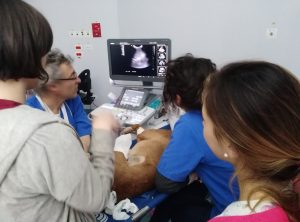Urinary C reactive protein levels in dogs with leishmaniasis at different stages of renal damage
Martínez-Subiela S, García-Martínez JD, Tvarijonaviciute A, Tecles F, Caldin M, Bernal LJ, Cerón JJ.
Urinary C reactive protein levels in dogs with leishmaniasis at different stages of renal damage
Res Vet Sci. 2013 Dec;95(3):924-9. doi: 10.1016/j.rvsc.2013.07.002. Epub 2013 Aug 6
Abstract
The objectives of the study were to validate a time-resolved immunofluorometric assay for C reactive protein (CRP) quantification in urine of dogs and to investigate the influence that the presence of proteinuria and azotemia could have on serum and urinary CRP (uCRP) values in dogs with leishmaniasis. Samples obtained from dogs naturally infected with Leishmania infantum were classified into four groups on the basis of the results of urinary protein/creatinine ratio and serum creatinine (sCr). In addition, 7 dogs were monitored at initial diagnosis and after a follow up visit. The assay showed good analytical performance based on precision, accuracy and limit of detection results. Results of the study suggested that CRP is present in urine of dogs with leishmaniasis and renal damage since uCRP/creatinine ratio was significantly increased in dogs with proteinuria, being the highest values observed in dogs with proteinuria and elevated sCr, and that the measurement of uCRP could be a tool to detect and evaluate the possible kidney damage associated with this disease






 Il Direttore Sanitario Dott. Marco Caldin
Il Direttore Sanitario Dott. Marco Caldin